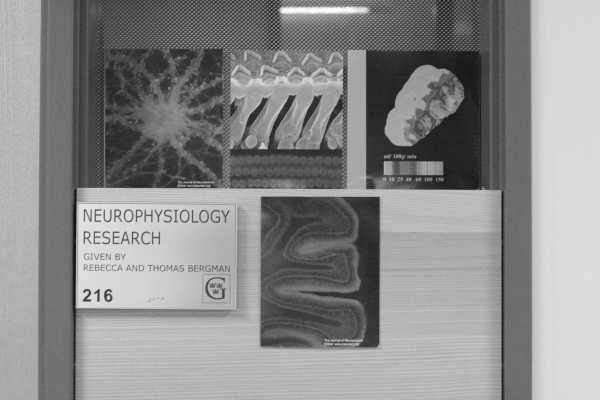 It is easy to forget all the work that our brain does for us. It does it all. It is able to manage the physiological and philosophical demands of each person. Not to mention, your brain is the creator of everything that makes up your “Self.”
It is easy to forget all the work that our brain does for us. It does it all. It is able to manage the physiological and philosophical demands of each person. Not to mention, your brain is the creator of everything that makes up your “Self.”
It is a well-oiled machine and a part of your body. But like parts of your body, it needs care and attention. We place a great deal of demand on our brains every day. Sometimes this strain becomes too much, hormones are not produced as they should be.
We are students at a Liberal Arts College that encourages us every day to make our lives count. We do this by overloading our classes, getting involved in multiple organizations, and depriving ourselves of sleep and a healthy lifestyle to get it all done. Sometimes we put in 36 hour days and fuel our bodies on coffee and whatever food we can carry in our hand. We push our bodies, AND OUR MINDS to the max and force them to run on empty more times than we should. Add in a few external stressors like a death in the family, financial stress, or relationship troubles of any kind, and you have the perfect equation for some sort of mental response to the situation.
Imagine that you have broken your arm. You are able to rationalize that you have a broken arm because it is right there. You know the cause of the pain. You know that you should go to the doctor, get it mended, and take medication to help manage the pain. People can acknowledge your broken arm and can understand that it is likely the cause of your unusual behavior.
Let’s put all of this into context. With everything we have going on in our lives, it is not surprising that the average age for onset of mental illnesses like Anxiety Disorders or Depression is early 20’s. Issues we are facing is the invisible nature of these illnesses and the stigmas to which they are attached.
With a broken bone, it is easy to see what needs to be done and the mending process is one that you can physically see. The brain is not that simple. When it isn’t able to produce a certain hormone, or creates too much of a hormone, we can’t see that. We see the residual effects of it: panic attacks, sloth, melancholy or oversensitive attitudes.
We can see all of that, but we cannot see the cause, and therefore we cannot easily rationalize what is wrong.
The people around you give you advice like, “Maybe you need to calm down,” or my favorite, “Just try to think of something happier.” It’s all so easy to say and they expect these notes to get results. But when the advice fails and you are still stuck in the same funk, they become frustrated, and distance themselves. If they can’t see it, they can’t help you. This sort of environment, one lacking in support and sprinkled with confusion and frustration with yourself, is not conducive to getting the help necessary to move forward.
Bringing this back to the idea of the self, when people experience a broken arm, they see it as it is. They know that the problem is merely with their arm and that with some rest and care it will mend. When there is a problem with the brain, there automatically becomes a problem with the self.
You start to get frustrated that you can’t pull out of whatever you are feeling. It’s difficult, if not impossible to get yourself to go to work or to class. You just want to get back to the person you once were.
We have associated our minds so closely to our personalities that it is difficult to separate from the fact that our brain is an organ in our body that sometimes requires medical attention.
When you suffer from anxiety, depression, or any other mental illness, there is nothing wrong with you. There is not a problem with the person you know yourself to be. There is simply a need for you to care for your brain and bring it back to health. This can be done with therapy, medication, changes in lifestyle, anything that works for you, so long as you are making the conscious effort to recognize your struggle, and move forward to better health.
This forward motion is not easy to accomplish. We cannot expect those afflicted to act alone. If your friend is struggling, hug them. Help them. Go to the counseling center with them and make an appointment. We need to foster a deeper sense of understanding with issues related to mental illness and health. We need to work together as friends, and classmates, to create a supportive and safe environment so that people can learn how to take care of themselves and become healthier, happier, and more resilient people. We must erase the stigma of mental illness.
“We have associated our minds so closely to our personalities that it is difficult to separate from the fact that our brain is an organ in our body that sometimes requires medical attention.”
The mind is the architect of every emotion in our repertoire. From it we experience sorrow, joy, rejection, ecstasy, and pain. This pain is not always visible, but that does not mean it is not real. These illnesses are not an indicator of weakness. They are merely obstacles. The process to overcome them will not happen overnight. It will be long and frustrating.
Sometimes you’ll feel as if you’ve made no progress at all. But the acknowledgement of them, the attempt to find a place where you can live with this struggle, and eventually thrive from it, is a sign of incredible strength.
There is no other mind like yours. There is none other that has seen, touched, or created exactly what you have. You are yourself, regardless of the obstacles you are facing.
If you don’t feel like yourself, seek help talk to someone, write in a journal, and just take care of you. If you don’t care for yourself, no one else will.
-Nikki Rom
